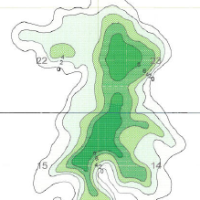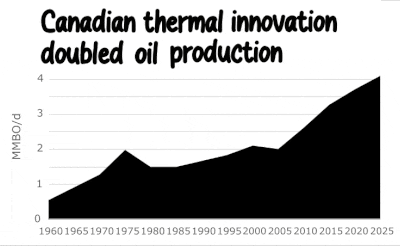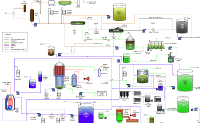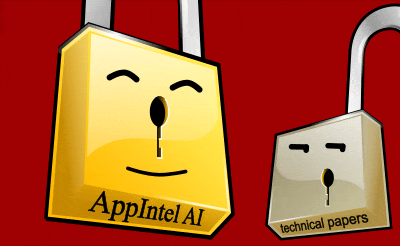ASP flood quadrupled
To celebrate, one operator quadrupled his ASP flood
 There are two $50 oil points. WTI passed the first point on the way down. The other we just passed last week on the way up.
There are two $50 oil points. WTI passed the first point on the way down. The other we just passed last week on the way up.
The first $50 oil point was seen with pessimism and fear.
The more recent $50 oil point was a day of cheering and optimism.
One operator is even quadrupling an ASP flood. His application contains his work on injectant composition and his injection pattern.
Without AppIntel, how would you find out how others are improving their ASP floods?
You can see his proposal to the AER by ordering his application from AppIntel. Just click the button below.
Get details of this cool tech Subscribers get them for free?subject=Help me get up to speed on ASP flooding&body=Help me get up to speed on ASP flooding%0D%0A%0D%0AMy Name:__________ %0D%0AMy Phone Number:__________ %0D%0A%0D%0A(Or call Proven Sales at 403-803-2500.)">Contact Proven for support. We have all the details from all the installations.
Polymer is expensive
Injecting polymer into a floods is much more expensive than just injecting water. Even if the polymer shuts off some water and encourages more oil production, the additional cost of injectant can seriously mar the flood economics.
Polymer or ASP?
Most polymer floods in Canada are now ASP floods. The staged ASP strategy amplifies recovery. But ASP is even more expensive than polymer floods.
The P in ASP stands for polymer. The polymer is expected to set up and plug areas in the reservoir where water has already swept. The polymer also increases the viscosity of the injectant to reduce fingering and increase recovery.
S is for Surfactant. Surfactant changes the wettability of the system which causes more oil to be mobile. Then the oil can be pushed by the polymer.
A is for Alkali. Alkali pretreats changing the acidity of the formation water so the surfactant can do its job. In the reservoir, the Alkali also creates a polymer soap -- a natural surfactant.
Get the real ASP story from applications
A, S and P chemical manufacturers all claim superior results. But the best way to be sure is to study results in others' fields.
If you can find a field that is under ASP flood, you can study the success (or failure) for yourself. You can look at the production results. You can determine how much the reserves increased. You can decide how much the water cut dropped.
Applications have a much more trustworthy story about the success and failure of ASP than any other source. Better than sales literature. Better than technical papers.
Every application is ground-truthed to an actual well location in UTM or Lat/Long. You can follow up your reading of an ASP application with an actual look back at the production history before, during and after the ASP injection.
Better than technical papers
Applications are a much better source of information than technical papers for two reasons. First, applications are adjudicated by a picky regulator rather than a peer reviewer. The regulator is interested in increasing reserves, not in exploring science.
Second, applications explore both the benefits and also the problems and difficulty with ASP. Technical papers usually only focus on one dimension of field or lab results.
?subject=I want a cheap and cheery one day trial of AppIntel to search for ASP schemes&body=Sign me up fro a one day AppIntel trial so I can to search for ASP schemes.%0D%0A%0D%0AMy Name:___%0D%0AMy Phone Number:____%0D%0A%0D%0APricing: www.appintel.info/short-term-search/%0D%0A%0D%0A(Or call AppIntel Sales at 403-803-2500.)">Contact us now for a one day trial.
Tags: Polymer, Flood
 Granger Low 5 Dec 2016
Granger Low 5 Dec 2016

Experimental Propane Solvent co-injection in thermal
Continuing Canadian thermal innovation doubled oil production

Measuring the rate of oil and gas technology growth
Energy transition inside the oil industry

The rise of water recycle
Join or perish

AppIntel AI hit alerts
Ignite your insight

Blowdown and NCG injection
SIRs often reveal more than submissions

AppIntel AI contains much more than technical papers
More current. More coverage. More detail. More trusted.

New flood to double reserves for heavy oil pool
The age of water floods is not over

Flood repatterning
Extended life support

AI makes opportunity more accessible than conferences
Which sources of technical information do you trust?

Repairing microannulus in thermal wells
Check out the 4D seismic chamber thickness map




 Calgary, Alberta, Canada
Calgary, Alberta, Canada
 Share
Share